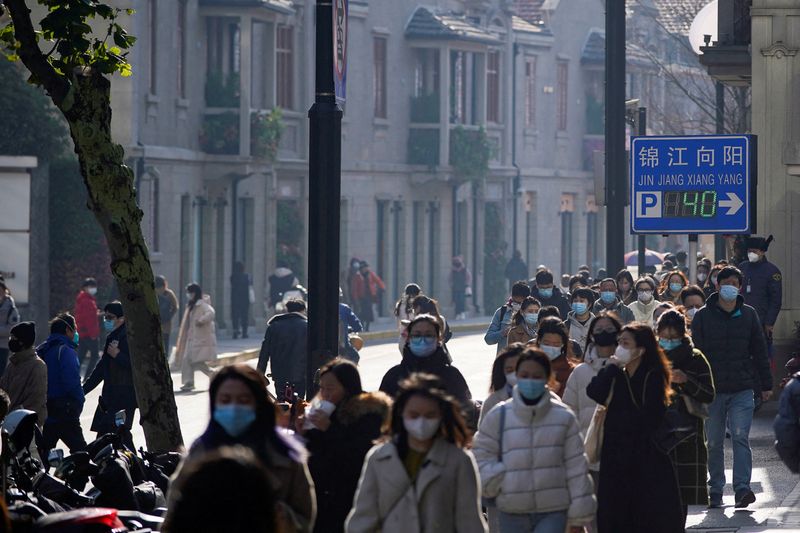China announced additional economic stimulus in 2023
2022.12.13 06:48
[ad_1]

China announced additional economic stimulus in 2023
Budrigannews.com – According to policy insiders and analysts, when China’s leaders meet this month to set the economic agenda for next year, they will likely plan additional stimulus measures to support growth and alleviate disruptions brought on by the sudden end to COVID-19 curbs.
At the annual Central Economic Work Conference, President Xi Jinping and other high-ranking officials are expected to talk about highly anticipated growth targets, increased fiscal spending on infrastructure and other programs, and the possibility of more monetary easing over the course of three days.
They face a formidable obstacle: A rise in infections is being ushered in by China’s recent relaxation of severe COVID restrictions, which are complicated by inconsistent messaging and a fragile healthcare system.
Bloomberg News reported on Tuesday that this uptick has already reached Beijing, where a sudden uptick in COVID infections delayed the start of the conference itself.
The conference must be held by the end of the year in order to establish policy for the new year, but the schedule has not been made public. Gathering before the finish of this current week had been broadly anticipated.
This year, economists and investors will be looking for clues on how the government intends to revive growth from the vague policy pronouncements and patchy media leaks that follow the secretive conference. They will be struggling with the lack of reliable data on China’s worsening COVID situation and seeking clarity on the economic outlook.
According to Zong Liang, chief of research at the state-owned Bank of China, “We must stabilize the property sector and we must boost domestic demand – consumption and investment.”
China’s economy, the second largest in the world, grew just 3% in the first three quarters of the year, well below the official goal of “around 5.5%.” It is expected to stay around that rate for the entire year.
In addition to China’s persistent property-sector crunch and a weakening global economy that hampered the export sector, COVID-related restrictions have slowed growth by frequently causing lockdowns, disrupting production, and reducing consumer spending.
More Germany will allocate 50 million for Ukraine
Due to rising costs to the economy and widespread public protests, the authorities last week abandoned key aspects of their strict anti-COVID stance.
Global markets applauded the move for its potential long-term economic benefits, but it also carries the short-term risk of an increase in infections and the associated pain.
China’s leadership is aware of the problem, including a new group of top economic officials chosen by the party congress in October, where Xi packed top party decision-making bodies with close allies. In March, they will officially take office.
China’s Politburo, a top Communist Party decision-making body, said last week that monetary policy would be targeted and forceful while fiscal policy would be increased and become more effective next year.
According to policy sources and analysts, Reuters, the central bank is likely to increase its structural tools’ targeted support for troubled sectors.
Last month, government advisors told Reuters that they would recommend that the conference adopt growth targets for 2023 that range from 4.5 percent to 5.5 percent, and a central bank advisor said that China should set a target of at least 5%.
In the lead-up to the meeting, suggestions that China should aim for growth of around 5% have gained traction since then.
A government adviser, who spoke on condition of anonymity due to the confidential nature of the discussions, stated, “I believe we should set a growth target of above 5%.”
“I believe the budget deficit ratio should be raised to at least 3% next year, and we need to step up fiscal policy.”
The target for the budget deficit in 2022 was set at about 2.8% of GDP.
According to government advisers, the government is likely to maintain its annual inflation target of around 3% the following year.
This month, the head of the central bank, Yi Gang, said that he would focus on helping the economy slow down and that consumer inflation was likely to stay moderate in 2023.
The meeting is expected to approve important economic goals, but they won’t be made public until China’s annual parliament meeting, which usually takes place in March.
Analysts at JPMorgan (NYSE:) predict that “(next year) will be the first year under the leadership of the new economic team after the 20th Party Congress.” in a note to customers.
“China’s COVID policy shift will also undergo a transitional year in this year.”
They asserted that the conference would be crucial not only for the growth target but also for additional hints regarding monetary and fiscal policy, particularly any shift toward transfers to households, as well as for policies pertaining to housing and COVID.








